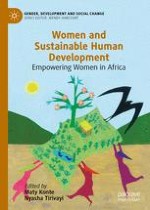2020 | OriginalPaper | Buchkapitel
4. Gender and Climate Change: Towards Comprehensive Policy Options
verfasst von : Gregor Schwerhoff, Maty Konte
Erschienen in: Women and Sustainable Human Development
Verlag: Springer International Publishing
Aktivieren Sie unsere intelligente Suche, um passende Fachinhalte oder Patente zu finden.
Wählen Sie Textabschnitte aus um mit Künstlicher Intelligenz passenden Patente zu finden. powered by
Markieren Sie Textabschnitte, um KI-gestützt weitere passende Inhalte zu finden. powered by
